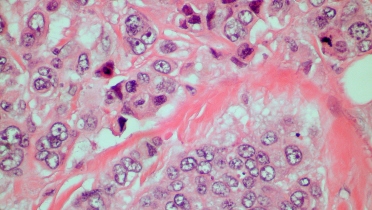Capivasertib, Fulvestrant Improves PFS in Patients with HR+/HER2– Breast Cancer
Compared with placebo, the addition of capivasertib to fulvestrant improved progression-free survival in patients with HR-positive/HER2-negative breast cancer whose tumors were resistant to aromatase inhibitors, according to study results presented at SABCS 2022.
Standard treatment options for HR-positive/HER2-negative cancers include aromatase inhibitors and CDK4/6 inhibitors. However, resistance to aromatase inhibitors can develop after first-line treatment. After progression has occurred on CDK4/6 inhibitors, additional endocrine therapies given alone have relatively low efficacy.
Due to the large number of breast tumors harboring alterations in the AKT pathway, the researchers conjectured that the combination of an AKT inhibitor and an aromatase inhibitor could be more effective than aromatase inhibitor monotherapy.
In the phase 3 CAPItello trial, they enrolled 708 patients whose cancers recurred or progressed following first-line treatment with an aromatase inhibitor.
The researchers randomly assigned patients fulvestrant plus placebo (n = 353) or fulvestrant plus capivasertib (n = 355). Capivasertib was prescribed at a twice-daily dose of 400 mg for 4 days, followed by 3 days off therapy.
Most of the study population was postmenopausal (77%) and had one or more prior therapies (87%), including CDK4/6 inhibitors (69%) and chemotherapy (18%).
Objective response rates favored capivasertib in the overall population (22.9% vs 12.2%) and in patients with AKT-altered tumors (28.8% vs 9.7%).
Capivasertib was associated with a median PFS of 7.2 months, compared with 3.6 months for patients assigned placebo. (HR = 0.6; 95% CI, 0.51-0.71; P < .001). Median PFS also favored capivasertib in patients with AKT-altered tumors. (7.3 months vs 3.1 months; HR = 0.5; 95% CI, 0.38-0.65; P < .001).
Common adverse events of any grade associated with capivasertib plus fulvestrant included diarrhea (72.4%), rash (38%), and nausea (34.6%). Grade 3 or higher adverse events included rash (capivasertib vs placebo, 12.1% vs 0.3%), diarrhea (9.3% vs 0.3%), and hyperglycemia (2.3% vs 0.3%).
Thirteen percent of patients assigned to capivasertib discontinued treatment due to adverse events as did 2.3% of patients assigned to placebo.
“The improvement in progression-free survival with relatively well-tolerated side effects is extremely encouraging. We are hopeful that capivasertib will become a new treatment option for patients whose cancer has progressed on a regimen containing an endocrine therapy,” Nicholas Turner, MD, PhD, professor of molecular oncology at The Institute of Cancer Research, London.
--
Reference:
Nicholas T. Adding Capivasertib to Fulvestrant Improves Progression-free Survival in Patients with Advanced Hormone Receptor-positive Breast Cancer. SABCS 2022 (San Antonio Breast Cancer Symposium).
Disclosures: Turner declared financial ties to drugmakers. The study was supported by AstraZeneca. CAPItello is being supported by AstraZeneca.
Photo Credit: Getty Images.
By Cameron Kelsall, MD /alert Contributor
.jpg)















.jpg)
.jpg)
.jpg)


.jpg)
.jpg)
.jpg)
.jpg)
.jpg)


.jpg)
.jpg)
.jpg)
.jpg)
.jpg)
.jpg)
.jpg)
.jpg)
.jpg)

.jpg)
.jpg)
.jpg)

.jpg)
.jpg)
.jpg)
.jpg)


.jpg)
.jpg)

.jpg)
.jpg)
.jpg)


.jpg)
.jpg)





.jpg)
.jpg)
.jpg)
.jpg)
.jpg)

.jpg)
.jpg)

.jpg)
.jpg)

.jpg)
.jpg)
.jpg)
.jpg)
.jpg)
.jpg)
.jpg)
.jpg)
.jpg)
.jpg)
.jpg)
.jpg)
.jpg)
.jpg)
.jpg)
.jpg)
.jpg)

.jpg)

.jpg)

.jpg)
.jpg)
_.jpg)


.jpg)

.jpg)
.jpg)


.jpg)

.jpg)
.jpg)
.jpg)
.jpg)

.jpg)

.jpg)

.jpg)
.jpg)
.jpg)

.jpg)
.jpg)
.jpg)
.jpg)
.jpg)
 Featured Breast Cancer Videos
Featured Breast Cancer Videos.jpg)